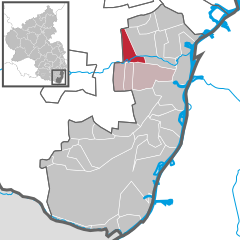Zeiskam | |
|---|---|
 Protestant church and city hall | |
Location of Zeiskam within Germersheim district  | |
| Coordinates: 49°13′58″N08°14′49″E / 49.23278°N 8.24694°E | |
| Country | Germany |
| State | Rhineland-Palatinate |
| District | Germersheim |
| Municipal assoc. | Bellheim |
| Government | |
| • Mayor (2019–25) | Susanne Lechner [1] [2] (FW) |
| Area | |
• Total | 8.85 km2 (3.42 sq mi) |
| Elevation | 117 m (384 ft) |
| Population (2023-12-31) [3] | |
• Total | 2,175 |
| • Density | 250/km2 (640/sq mi) |
| Time zone | UTC+01:00 (CET) |
| • Summer (DST) | UTC+02:00 (CEST) |
| Postal codes | 67378 |
| Dialling codes | 06347 |
| Vehicle registration | GER |
| Website | www.zeiskam.de |
Zeiskam is a municipality in the district of Germersheim, in Rhineland-Palatinate, Germany.




